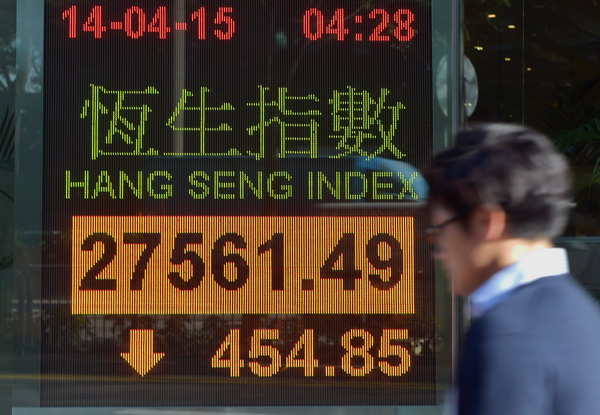Sustained capital inflows from mainland investors lift sentiment and trigger stock market frenzy, reports Xie Yu in Hong Kong.
 |
|
The Hang Seng Index drops 454.85 points amid market correction on Tuesday, Hong Kong, April 14, 2015. [Photo / Xinhua] |
Optimism remains high that a sustained rally in Hong Kong stocks will continue, despite the market correction on Tuesday, with analysts expecting further inflows of mainland funds to keep the market on the boil.
The dominance of the large United States-based investment banks, backed by billions of dollars of funds entrusted to them by foreign institutional investors, is facing a stiff challenge from mainland capital that is flowing into Hong Kong since trading resumed on April 8 after the Easter holiday break.
What has happened in Hong Kong since April was unusual, analysts said, noting it could signal the beginning of a new era.
"The Hong Kong stock market used to be dominated and guided by overseas investors. Some companies are undervalued because foreign investors do not give valuations as A-share market investors do. However, this situation is changing as mainland capital is now increasingly having a say on pricing," said Wang Yayuan, a strategist with Shenyin Wanguo Securities Co, based in Hong Kong.
This bull market is "obviously" led by mainland investors, said Kevin Leung, a strategist with Haitong International Securities Group Ltd in Hong Kong.
The real catalyst for the bull run came after mainland mutual funds were permitted to invest in Hong Kong stocks, sources said. The move prompted more mainland investors to relocate money from the A-share market and their bank accounts and use it for buying cheaper Hong Kong shares.
Individual investors, many of whom are dama (well-off middle-aged women), account for 90 percent of the trading volume on the A-share market (compared to 20 percent on the Hong Kong market), and have more than 40 trillion yuan ($6.44 trillion) worth of savings in their accounts, according to China International Capital Corp data. It is a group that nobody dares to neglect.
"The feeling is that investors rushed in and bought in whatever was on the market, regardless of valuation, liquidity, or anything. They did it roughly, something similar to last November, when large capital suddenly flocked into the A-share market and propelled the index higher," he said.
Foreign investors were astonished to see the Hang Seng Index surge by almost 1,000 points and hit a seven-year high last Wednesday, with 29 companies jumping by more than 30 percent, and more than 300 shares by more than 10 percent. The daily quota under the Shanghai-Hong Kong Stock Connect was used up by early afternoon.
Similar situation happened on the following trading day, and the benchmark extended the gains untill Monday, rising by 7 percent in four consecutive trading days.
Small chips with their business in the mainland became the most stunning stars in the past days. Some saw share prices surge by 30 to 40 percent in a day, and saw share prices double in the eight-day run. For example, BBI Life Sciences Corp, which is into genetics business, saw its share price soar by 45 percent and 25 percent last Tuesday and Wednesday, before slumping 8 percent on Tuesday.
Lu Wenjie, an H-share strategist at UBS Securities Co, said: "The so-called 'Hong Kong A shares' are chased by mainland investors, and the logic is very similar to the mainland market. Small chips with attractive stories and prospects win more investment, and they are much cheaper in Hong Kong."
But they do not fit in with the investment style of foreign investors-the latter prefer bigger shares with good liquidity and strong fundamentals, he said.
